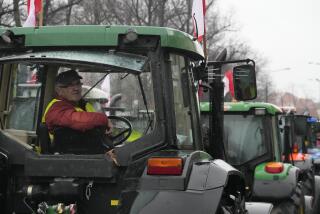Massive Police Presence in Polish City : Security in Krakow Tight During Gorbachevs’ Visit
- Share via
KRAKOW, Poland — The 14th-Century Old Market Square in the center of Krakow is usually bustling in the late afternoon, crowded with shoppers and homeward-bound office workers. By the time the sun slants against the ancient bell tower of St. Mary’s Church, the quaint carts of the flower sellers are circled with customers.
On Tuesday, however, the atmosphere of the square was transformed by the studiously casual presence of about 1,500 plainclothes security policemen, placed there by nervous authorities apparently fearful that Soviet leader Mikhail S. Gorbachev, who was having a late lunch nearby, might have an unrehearsed encounter with an ordinary Polish citizen.
The flower sellers were glum. “We haven’t sold a flower in three hours,” one grumbled. “These people”--she nodded toward the knots of plainclothesmen--”they don’t buy anything.”
The scene at the square was an indication of the level of caution being exercised by the government of Gen. Wojciech Jaruzelski for a six-day visit to Poland by the Soviet exponent of Communist reform.
Polish authorities, in the first two days of the visit by Gorbachev and his wife, Raisa, have been careful to orchestrate each of Gorbachev’s characteristic “walkabouts” so that a controlled crowd, usually made up of party members, security policemen and secretaries from government offices, is standing by to chat with him.
‘Just Security Precautions’
“It is just basic security precautions,” said Wieslaw Gornicki, a special secretary to Jaruzelski. “Otherwise we would not be able to drive out of this square.”
Nevertheless, the crowd control seemed unusual, even by the standards of Eastern Europe. On Gorbachev’s visits to Prague, Belgrade and Bucharest, crowds have at least been able to approach the major public sites he has visited. But the Poles blocked the square here even to residents. Workers from outlying factories and offices were given special buttons to pass through police lines.
After his walk through the square, his passage directed between parallel lines of plainclothesmen, the Gorbachevs, accompanied by Jaruzelski, spent 15 minutes touring the Gothic St. Mary’s Church, escorted by Jan Szkodon, the auxiliary bishop of Krakow. The archbishop, Cardinal Frantiszek Macharski, was not in the city at the time.
Gorbachev, through the rest of his visit, is not expected to meet with any other figures of Poland’s powerful Roman Catholic Church.
Gorbachev also visited a museum in the Tatra Mountain town of Bialy Dunajec, where the Russian revolutionary V.I. Lenin spent portions of two years in 1913 and 1914. He also inspected the Lenin Memorial at the nearby town of Poronin. Lenin was jailed there briefly in 1914, on a charge of spying for Russia. After two weeks of detention he was allowed to leave for Switzerland.
‘We Feel Your Problems’
“ Perestroika will require a lot of time and effort,” Gorbachev told a crowd at the Lenin Memorial, referring to his campaign of restructuring Soviet politics and economics. “The most significant effort will have to be made by the next generation. We appreciate your problems. We feel your problems, but one must work through them.”
Following his visit to the church, the Gorbachevs met with a selected group of Polish and Soviet young people at the medieval Wawel Castle. He encouraged greater contact between Polish and Soviet youths in order to promote understanding between the two countries.
“Let the young people visit their peers if they want to,” he said. “Let them appear with rucksacks in Moscow and Warsaw, in Krakow and Kiev. This is the most authentic form of getting closer to each other.”
Today Gorbachev will go to Szczecin on the Baltic coast to address shipyard workers.
More to Read
Sign up for Essential California
The most important California stories and recommendations in your inbox every morning.
You may occasionally receive promotional content from the Los Angeles Times.













